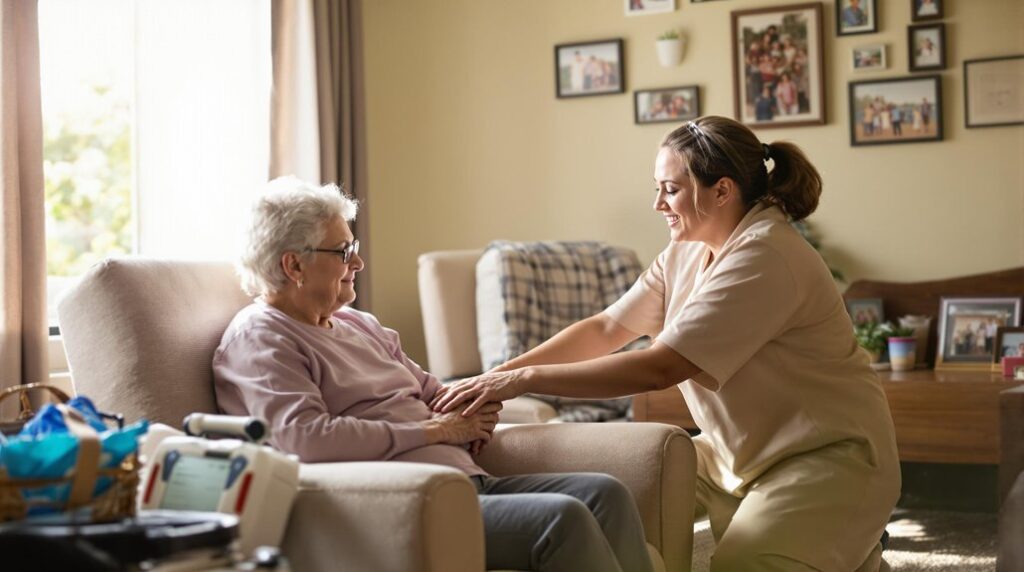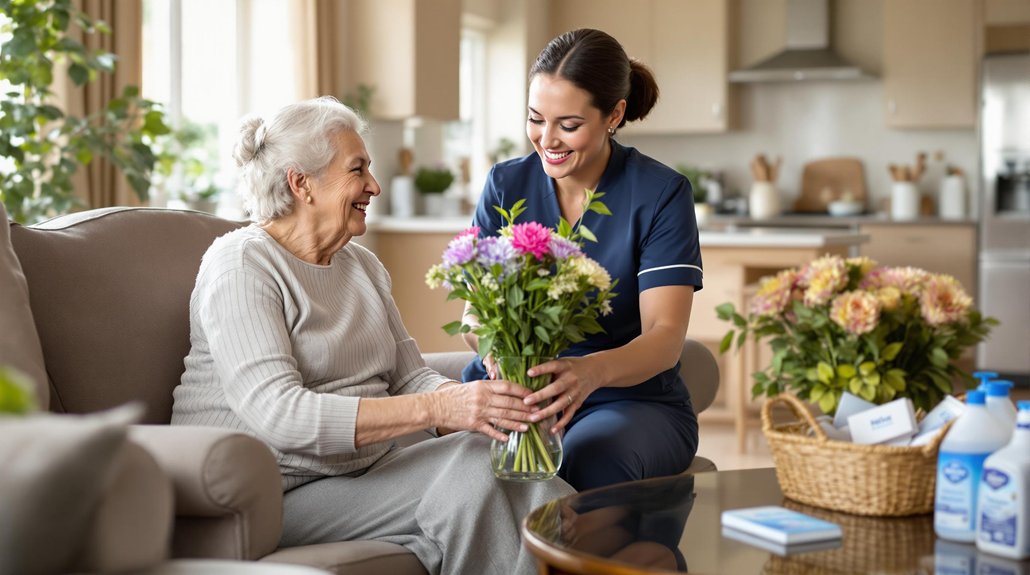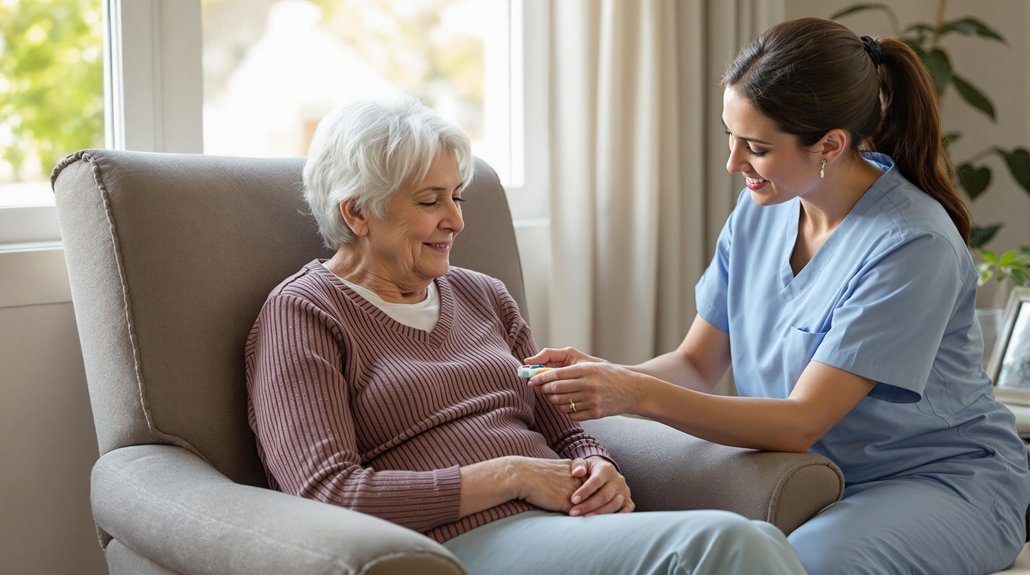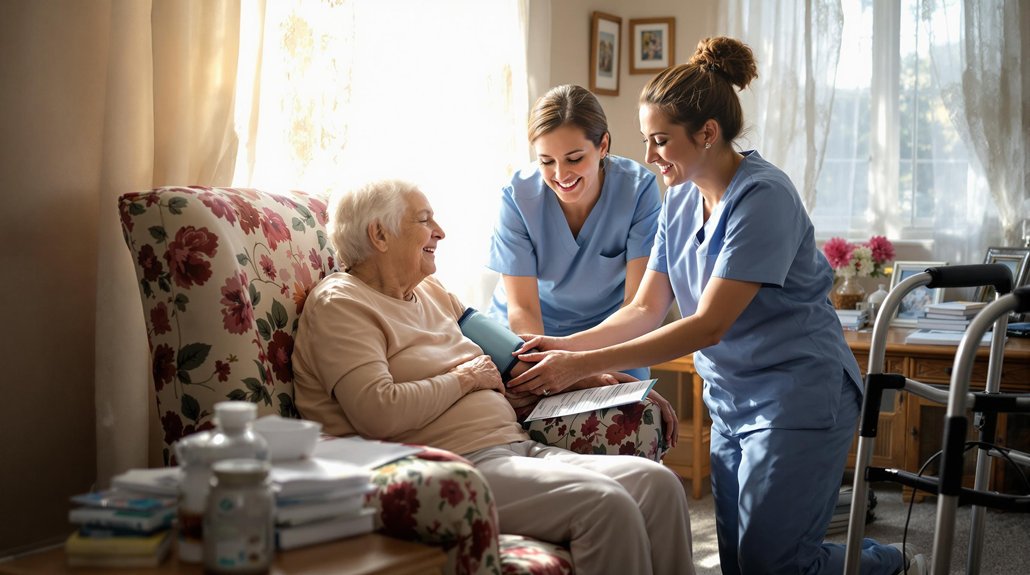If your looking for In home care please Click here or call 561-693-1311
Types of Home-Based Elderly Care Options
When considering home-based care for elderly loved ones, several options can meet their specific needs and circumstances.
You’ll find in-home care services that provide essential daily assistance with personal hygiene, meal preparation, and medication management.
Companionship services offer social interaction and emotional support, while specialized therapies help maintain physical and cognitive functions.
For families needing temporary relief, respite care allows primary caregivers to take necessary breaks.
Adult day programs provide structured activities and supervision during daytime hours.
If your loved one requires medical attention, nursing support delivers professional healthcare at home.
Memory care specialists assist those with dementia or Alzheimer’s, while palliative care focuses on comfort and quality of life for those with serious illnesses.
You can mix these services to create an all-encompassing care plan.
With over 100 insurance options accepted, families can find accessible and affordable care solutions that meet their specific needs.
Key Responsibilities of Family Caregivers
Family caregivers play multiple roles in supporting their elderly loved ones, even when professional services are part of the care plan. As a family caregiver, you’ll need to coordinate medical appointments, manage medications, and monitor your loved one’s health conditions.
You’re also responsible for assisting with personal care tasks like bathing, dressing, and grooming. Your caregiver roles extend to maintaining a safe living environment, preparing nutritious meals, and handling household duties.
You’ll oversee finances, insurance matters, and legal documentation while managing family dynamics among siblings and other relatives involved in care decisions. Additionally, you’ll provide emotional support and companionship, helping your loved one stay socially connected and mentally engaged.
It’s crucial to recognize when you need help and to seek support from other family members or professional services. Consider exploring non-skilled home care options to help manage daily living activities and provide relief from caregiver stress.
Benefits of Caring for Elderly at Home
Caring for elderly loved ones at home offers significant advantages for both caregivers and seniors. You’ll provide consistent emotional support while maintaining family bonds in a familiar environment. Your presence helps reduce anxiety and depression in aging relatives who might otherwise feel isolated in institutional settings.
When you care for seniors at home, you can closely monitor their physical health, immediately notice changes in their condition, and guarantee they follow medication schedules.
You’ll also have direct control over their diet, exercise, and daily routines, which can lead to better health outcomes. Home care allows you to create personalized care plans that respect their preferences and preserve their dignity.
Additionally, you’ll save considerable money compared to nursing home costs while guaranteeing your loved ones receive attentive, individualized care from someone who truly knows them. Fall prevention strategies are essential components of home care to ensure the safety and independence of elderly loved ones.
Essential Skills and Qualifications Required
Providing effective home care requires specific skills and knowledge to guarantee your elderly loved one’s wellbeing.
You’ll need both technical expertise and emotional intelligence to deliver quality care that meets their unique needs.
- Complete a certified nursing assistant (CNA) program or home health aide certification to learn proper caregiving techniques, safety protocols, and basic medical procedures.
- Develop strong communication skills through empathy training and active listening courses to better understand and respond to your senior’s needs.
- Master time management and organizational abilities to coordinate medications, appointments, and daily activities efficiently.
- Learn emergency response procedures and maintain current CPR certification to handle unexpected medical situations confidently.
These qualifications will help you provide thorough care while ensuring your elderly loved one’s safety and comfort at home.
For specialized support needs, skilled home care services can provide licensed professionals who deliver medical expertise and rehabilitation therapy in a familiar environment.
Support Services and Resources Available
While taking care of an elderly loved one can feel overwhelming, you’ll find numerous support services and community resources to help lighten the load.
Local senior centers often provide adult daycare, meal delivery, and transportation services. You can also connect with support groups, both in-person and online, where you’ll meet others facing similar challenges and share experiences.
Check with your Area Agency on Aging to learn about financial assistance programs, including Medicaid waivers, veterans’ benefits, and respite care funding.
Many religious organizations and non-profits offer volunteer companionship services and temporary relief for caregivers.
Don’t forget to explore home health agencies that can provide skilled nursing visits, physical therapy, and personal care assistance when you need extra help or professional medical support.
Medicaid home health care services can provide cost-effective options for families while maintaining quality care in a familiar environment.
Managing the Challenges of Home Eldercare
Despite its rewards, home eldercare presents daily challenges that require patience, adaptability, and strategic planning. As you navigate this demanding role, you’ll face both emotional challenges and time management pressures while maintaining your loved one’s dignity and well-being.
- Create a daily routine that balances your caregiving duties with personal time to prevent burnout and maintain your mental health.
- Address emotional challenges by joining support groups where you can share experiences and coping strategies with other caregivers.
- Develop an efficient time management system by prioritizing tasks and using calendar apps to track medications, appointments, and care schedules.
- Set realistic expectations for yourself and learn to accept help from family members or respite care services when you need a break.
Creating a Safe and Comfortable Care Environment
To guarantee your elderly loved one thrives at home, you’ll need to create an environment that prioritizes both safety and comfort.
Start by implementing essential home safety measures like installing grab bars in bathrooms, removing trip hazards, and making certain proper lighting throughout the house.
Focus on comfort measures that enhance their daily living experience. Add supportive seating with proper back support, maintain a consistent room temperature, and organize their living space for easy access to frequently used items.
Place emergency contact numbers within reach and consider installing a medical alert system.
You’ll also want to make their bedroom cozy with proper bedding and make certain their bathroom is equipped with non-slip mats and a shower chair.
These modifications will help your loved one maintain independence while staying secure in their home environment.
Conclusion
Taking care of elderly loved ones at home is like tending a cherished garden – it takes dedication, patience, and a gentle touch. Each day brings new experiences as you help your loved one with daily tasks, share stories, and create special memories together. While being a caregiver isn’t always easy, you’re doing something truly important by helping someone live with comfort and dignity in their own home.
Remember, you don’t have to walk this path alone. Just as your loved one needs support, so do you. Taking breaks and asking for help isn’t a sign of weakness – it’s a vital part of being a good caregiver. Focus Family Care understands your journey and is ready to stand by your side, offering the support and guidance you need to provide the best care possible.
If you or a loved one need help, don’t wait. Reach out to Focus Family Care today at (561) 693-1311 or email us at info@focusfamilycare.com.





